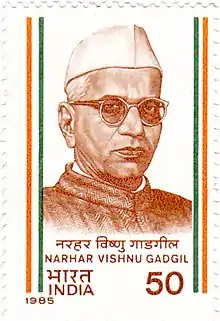Narhar Vishnu Gadgil
Narhar Vishnu Gadgil (10 January 1896 – 12 January 1966) was an Indian freedom fighter and politician from Maharashtra, India. He was also a writer. He wrote in both Marathi and English.[1] His son Vitthalrao Gadgil also represented Congress later as minister and ideologue.
Narhar Vishnu Gadgil | |
|---|---|
 Narhar Vishnu Gadgil on a 1985 stamp of India | |
| 3rd Governor of Punjab | |
| In office 15 September 1958 – 1 October 1962 | |
| Chief Minister | Partap Singh Kairon |
| Preceded by | Chandeshwar Prasad Narayan Singh |
| Succeeded by | Pattom Thanu Pillai |
| 1st Minister of Power | |
| In office 15 August 1947 – 12 December 1950 | |
| Prime Minister | Jawaharlal Nehru |
| Preceded by | Office Established |
| Succeeded by | Gulzarilal Nanda |
| Personal details | |
| Born | 10 January 1896 Malhargarh, British India (Now in Madhya Pradesh, India) |
| Died | 12 January 1966 (aged 70) |
| Political party | Indian National Congress |
| Education | Fergusson College |
_(Cropped).png.webp)
Gadgil graduated from Fergusson College in Pune in 1918, and obtained a degree in Law two years later.
Activities before India's independence
In India's pre-independence days, freedom fighters Lokmanya Bal Gangadhar Tilak, Mahatma Gandhi, Jawaharlal Nehru, and Vallabhbhai Patel influenced Gadgil. Spiritual leaders Swami Ramkrishna Paramhans and Swami Vivekanand also made a deep impression on him. He joined the Indian National Congress immediately after obtaining his law degree and started his active participation in the national freedom movement. He suffered imprisonment from the ruling British government eight times for the participation.
In India's pre-independence days, Gadgil served as the secretary of Poona District Congress Committee (1921–25), the president of Maharashtra Pradesh Congress Committee (1937–45), and the whip and secretary of the Congress Legislative Party (1945–47). He was elected to the central Legislative Assembly in 1934.
Gadgil was a pioneer in social reform movements in Maharashtra in the 1930s.
Service after India's independence
Between 1947 and 1952 Gadgil served as a minister in the first central cabinet of independent India. He held the portfolios of Public Works, and Mines and Power. In his first year in the central Cabinet, he initiated the project of building a military-caliber road from Pathankot to Srinagar via Jammu in Kashmir as a part of India's activities in the 1947 Indo-Pakistan War. As a cabinet minister, he also initiated the important development projects pertaining to Bhakra, Koyna, and Hirakund dams. He was a member of the Congress Working Committee during 1952–55 period.
Gadgil served as the governor of Punjab from 1958 to 1962 and as the vice-chancellor of Poona University 1964 onwards until his death less than two years later.
He was associated with several public associations and institutions, including Sarvajanik Sabha, Pune; Yong Men's Association, Pune; Maharashtra Youth League, Bombay; Pune Central Cooperative Bank; and Pune Municipality. His next generations, son Vitthalrao Gadgil was veteran congressman and MP from Pune Lok Sabha constituency and Anant Gadgil is currently spokesman for Maharashtra Pradesh Congress Committee.
Honor
The Indian Post & Telegraph Department issued a commemorative postage stamp in Gadgil's honor in 1985.[1]
Authorship
Gadgil wrote several books and articles on politics, economics, law, and history. He was elected president of Marathi Sahitya Sammelan in 1962 held at Satara.
The following are the titles of some of Gadgil's books:
- Pathik (Autobiography)
- Rajya Shastra Wichar
- Shubha Shastra
- Waktrutwa Shastra
- Gyanbache Arthashastra
- Government from Inside
- Shikhancha Itihaas (History of Sikhs)
References
| Wikimedia Commons has media related to Narhar Vishnu Gadgil. |
- "Narhar Vishnu Gadgil". Indian Postage Stamp Site. Retrieved 10 January 2017.